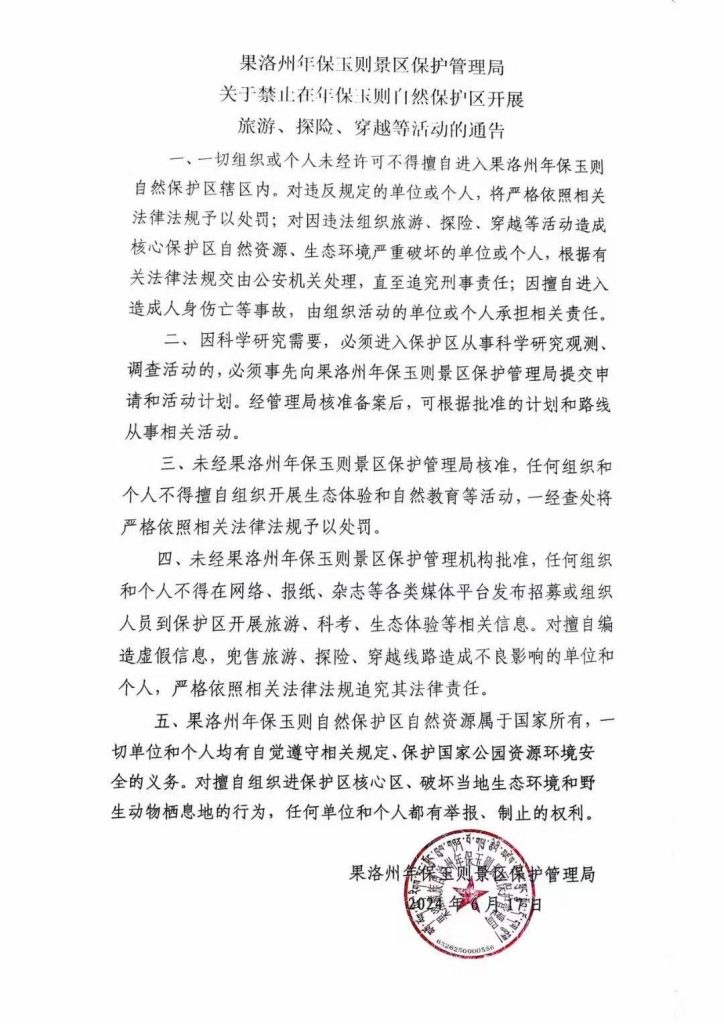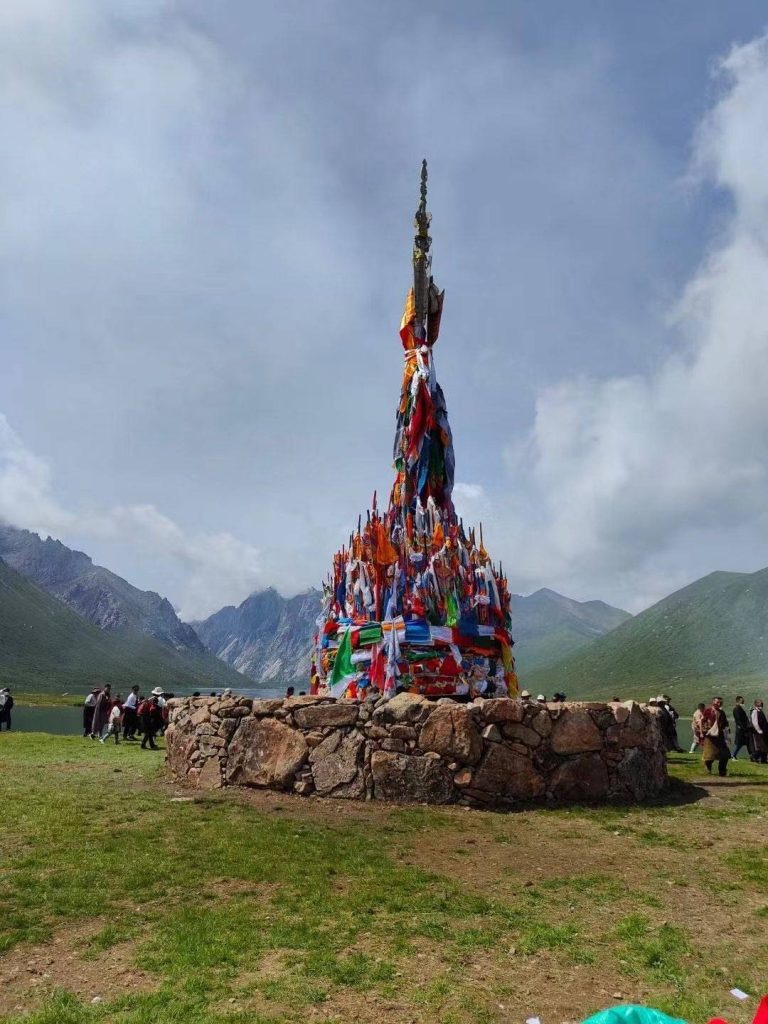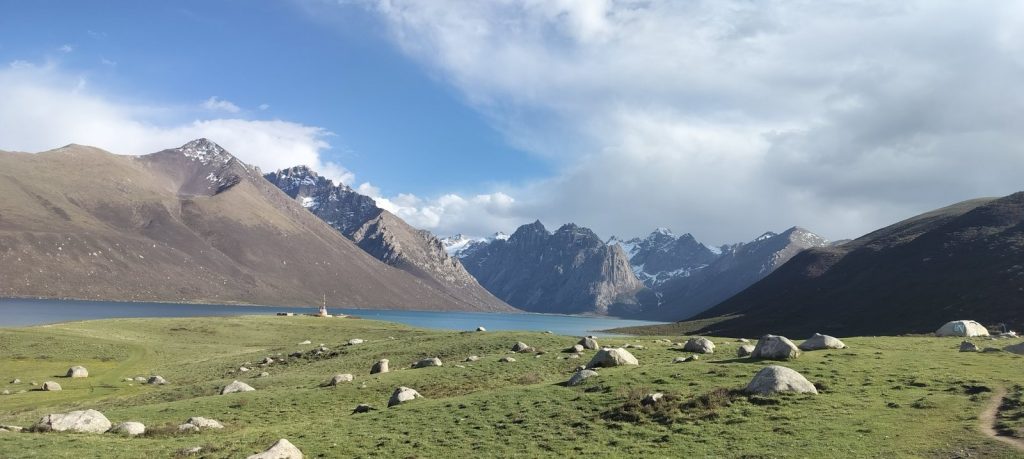Chinese authorities announce stringent restrictions on accessing sacred Tibetan religious site in Golok

A notice issued by the Golok Prefecture Nyenbo Yurtse Nature Reserve Protection Management Bureau prohibits individuals and organisations from entering the sacred Nyenpo Yurtse in Sogru town, Chikdril (Ch: Jiuzhi) county, Golok (Ch: Guoluo) Tibetan Autonomous Prefecture.
The five-point directive issued on 17 June bars both individuals and organisations from entering or conducting activities such as ecological experiences and natural education in the Nyenbo Yurtse area in Golok Prefecture without prior permission, emphasising that the authorities will strictly punish violators according to relevant laws if found guilty of not abiding by the directive. Additionally, the directive requires individuals to stop and report ‘unauthorised activities.’
This directive affects Tibetan Buddhist practitioners in Tibet, particularly those living in Golok, as Nyenpo Yurtse is revered as a sacred mountain and pilgrimage site. It is also considered the ancestral homeland of the Golok tribe, which is closely related to the people of Ngaba (Ch: Aba). Local Tibetans in Golok believe that the recent ban on entering the sacred site is a deliberate attempt by Chinese authorities to prevent the locals from gathering and performing their religious rituals. These rituals occur every July, including Sang-sol (burning juniper branches) and unfurling Lungta prayer flags in the sacred area.
Nyenpo Yurtse is surrounded by 360 lakes and ponds, along with numerous hot springs and medicinal waters that attract thousands of Tibetan pilgrims.
On 17 July 1992, two rival factions, the Akyong Khanggen (old Akyong) and Akyong Khangsar (new Akyong), set aside their differences and formed a truce at the shore of Yurtse Lake under the 6th Gungthang. During the ceasefire, the 6th Gungthang rinpoche took off his kera (monk’s belt) and hoisted it on latse (referring to constructions of earth and stone found across the Tibetan plateau). Since then, both the Akyong households have hoisted flags and burned sang (smoke offering) during the sixth month of the Tibetan calendar.

According to local Tibetans, tens of thousands of people visit Nyenpo Yurtse annually to perform rituals and make offerings to the deities. However, since the closing of the site by the Chinese government in 2018 under the pretext of ‘environmental protection,’ the number of visitors has drastically decreased. From the beginning, the Chinese party-state aimed to include Nyenpo Yurtse in the Sanjiangyuan Nature Reserve, as evidenced by its upgrade to a national nature reserve in 2003 and its designation as a national geological park in 2005. The Sanjiangyuan National Park covers four Tibetan Autonomous Prefectures (TAPs) and 21 counties in Kyegudo (Ch: Yushu), Golok (Ch: Guoluo), Malho (Ch: Huangnan), Tsolho, and Tanggula Town of Golmud City. China refers to the Sanjiangyuan area as ‘Asia’s Water Tower’ because it supplies 60 billion cubic metres of water annually to lower-lying lands of the region. The Chinese government has long eyed Tibet’s glaciers and alpine lakes to solve the chronic water shortages elsewhere as they continue to draw plans to divert water from the glacial lakes of Nyenbo Yurtse to Chinese cities. A source informed TCHRD that ‘the overarching goal behind issuing this directive is to end the Tibetan way of life and all its cultural and religious traditions and facilitate resource extraction’.
In recent years, Chinese authorities have increasingly targeted Tibetan Buddhist traditions and rituals, with an increasing number of Tibetans subjected to arbitrary detention for participating in acts of worship and devotion. In September 2023, four Tibetan men—Gyalo, Tsedo, Bhamo, and Kari—were each sentenced to two years in prison for merely engaging in sang-sol practice. This ritual, intended to purify spiritual pollution, alleviate blockages, and cleanse, was performed while reciting prayers for the longevity and well-being of Tibetan Buddhist masters in Serthar County.
In the same month, a new regulation on the ‘Measures for the Management of Religious Activity Sites’ was implemented that extensively and substantially broadened the scope and breadth of government control over religious affairs. Article 3 of the regulation sums up the overarching objectives guiding the implementation of these rules: “Places of religious activities must uphold the leadership of the Communist Party of China, support the socialist system, fully implement Xi Jinping Thought on Socialism with Chinese Characteristics for a New Era, comply with the constitution, laws, regulations, rules, and relevant provisions on religious affairs management, embody socialist core values, adhere to the path of sinicisation of Chinese religions, uphold the principle of self-governance and independence, and safeguard national unity, ethnic unity, religious harmony, and social stability.
No individual or organisation is permitted to utilise religious venues for activities that jeopardise national security, disrupt social order, endanger public health, obstruct the national education system, violate public morals, or otherwise harm national interests, public interests, or the legitimate rights and interests of citizens. Religious sites must refrain from engaging in illegal activities or facilitating conditions conducive to illegal conduct.”



